Scratch Spirogryo Original Design / Scratch Built
Scratch - Spirogryo {Scratch}
Contributed by Brock Freeman
| Manufacturer: | Scratch |
Construction:
Use any glue you want except hot melt. Sequence: 2) glue the 3 triple tubefin arrays to the bottom sides of the motor assembly to form a triangle (see photo), 1/4" from the bottom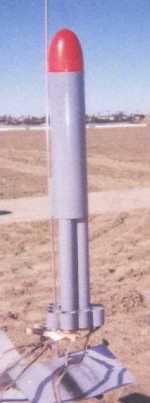
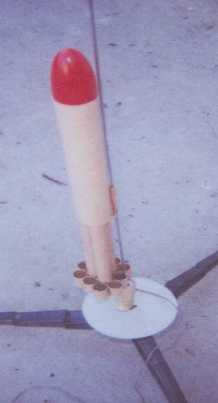 Brief:
Brief:
Spirogyro is a tubefin rocket that is a little different. The tube fins are arranged in a triangle instead of a circle as usual. This gives it some interesting flying properties. It oscillates rapidly and leaves a fine corkscrew smoke trail. The rocket is made entirely out of interlocked tubing, so it is very strong and easy to build. I designed Spirogyro for the BRS design contest as a 3 x 18mm cluster. I hope you like it.
Construction is unusual. It is all tubes. No centering rings or motor hooks or balsa. The component list (see photo) is short, cheap and all available from the BRS website:
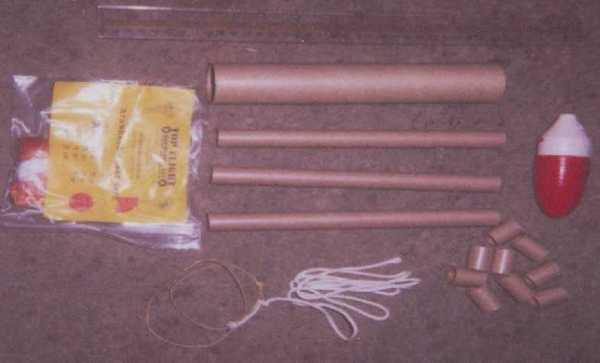
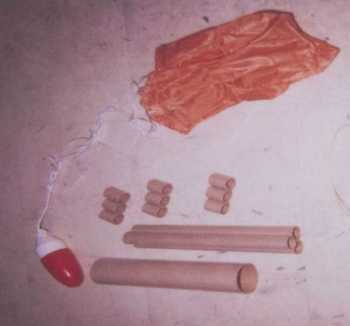 1) glue the 3 9" motor tubes in a triangular array, and the 1" tube fins into 3 sets of 3 (see photo)
1) glue the 3 9" motor tubes in a triangular array, and the 1" tube fins into 3 sets of 3 (see photo)
3) tie Kevlar and shock cord together, tie a knot in the bottom of the Kevlar, and stuff this knot into the tiny triangular space in the top end of the motor tubes, with bit of glue and paper wad on top to retain it
4) make a pen mark 1 1/2" from the top of the motor assembly, apply glue to the inside of the 9" motor tube end, and insert the motor end up to the mark -- nake sure to first pass the recovery elastic all the way through the body tube
5) complete the recovery system by tying the elastic to the nose cone, and the chute to the elastic 3" below the cone
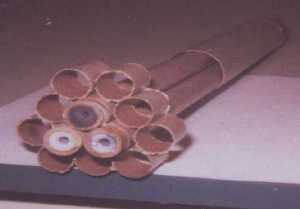 6) attach lug to 9" body tube flush with botton and exactly lined up with the center of one of the tube fin triangle sides
6) attach lug to 9" body tube flush with botton and exactly lined up with the center of one of the tube fin triangle sides
7) be sure to plug the triangular spaces between the motor tubes and the body tube with a mix of shredded tissue and glue, or the ejection changes won't eject the chute
8) I finished the rocket with Testor's gray and red for the nose cone
Final Specs: 18" x 1.36" - 2.5 oz
Flight:
Motor retention can be with friction fit, or with the optional delux method: glue the 4-40 threaded rod halfway into the bottom of the motor assembly, in the tiny triangular space between the motors. Use epoxy for this. All three motors are retained by screwing the nut onto the washer over the motor casing edges. For this methos, you need to glue into each motor tube a motor stop, which you can buy from BRS or make from 1/8" slices from a spent 18mm casing. Dab with glue and push one into each motor tube with a spent 18mm casing until 1/4" protrudes, then immediately pull out the casing.
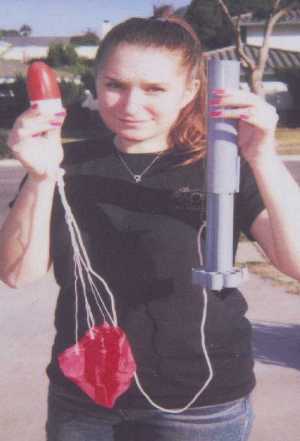 Spirogyro was designed for a cluster of 3 B4-4 motors. It needs no nose weight for this load. It will fly more than 600' high on this power, with a tight corkscrew smoke trail. I have also flown Spirogyro on 3 x C6-7's, but this needs an ounce of ballast in the Big Bertha cone for balance. On this "E18" power, the rocket goes out of sight, to about 1300' or more according to the sim program. I have flown the rocket on 2 C6 motors to simulate a misfire, and the result was not pretty -- all over the sky.
Spirogyro was designed for a cluster of 3 B4-4 motors. It needs no nose weight for this load. It will fly more than 600' high on this power, with a tight corkscrew smoke trail. I have also flown Spirogyro on 3 x C6-7's, but this needs an ounce of ballast in the Big Bertha cone for balance. On this "E18" power, the rocket goes out of sight, to about 1300' or more according to the sim program. I have flown the rocket on 2 C6 motors to simulate a misfire, and the result was not pretty -- all over the sky.
So use a reliable ignition method, whip clips or (my favorite) using 3 adjacent pads on the club lanuch rack (see photo). On the 7th test flight, on 3xC6-power, I forgot to screw on the retainer nut, and Spirogyro spit all 3 casings and lawn darted from a quarter mile up. Only damage was 1/2" of crushed upper body tube, which I cut away and has the rocket flying again in a few minutes. So its pretty strong.
Summary:
PRO: Easy and cheap to build even for a beginner. Strong. Good first cluster rocket. Unusual looks, and performance with spiral smoke trail. No fins to break off.
CON: Needs a whole pack of motors for each flight. Needs 12 volt ignition system. Not stable if a motor misfires.
Sponsored Ads
 |
 |











